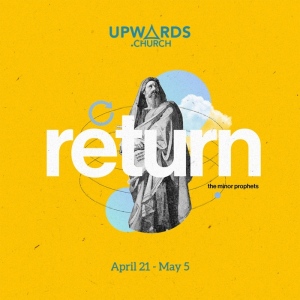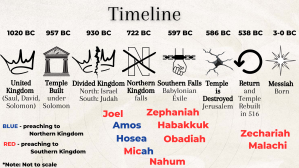 Volcanos, earthquakes, tidal waves, hurricanes, and tornados unleash uncontrollable and unstoppable force. And we can only avoid them and then pick up the pieces.
Volcanos, earthquakes, tidal waves, hurricanes, and tornados unleash uncontrollable and unstoppable force. And we can only avoid them and then pick up the pieces.
But these forces cannot touch the power of omnipotent God. Creator of galaxies, atoms, and natural laws, the Sovereign Lord rules all there is and ever will be. How silly to live without him; how foolish to run and hide from him; how ridiculous to disobey him. But we do. Since Eden, we have sought independence from his control, as though we were gods and could plot our destiny. And he has allowed our rebellion. But soon the day of the Lord will come.
It is about this day that the prophet Joel speaks, and it is the theme of his book. On this day God will judge all unrighteousness and disobedience—all accounts will be settled and the crooked made straight.
We know very little about Joel—only that he was a prophet and the son of Pethuel. He may have lived in Jerusalem because his audience was Judah, the southern kingdom. Whoever he was, Joel speaks forthrightly and forcefully in this short and powerful book. His message is one of foreboding and warning, but it is also filled with hope. Joel states that our Creator, the omnipotent Judge, is also merciful, and he wants to bless all those who trust him.
 Joel begins by describing a terrible plague of locusts that covers the land and devours the crops. The devastation wrought by these creatures is but a foretaste of the coming judgment of God, the “day of the LORD.” Joel, therefore, urges the people to turn from their sin and turn back to God. Woven into this message of judgment and the need for repentance is an affirmation of God’s kindness and the blessings he promises for all who follow him. In fact, “everyone who calls on the name of the LORD will be saved” (2:32).
Joel begins by describing a terrible plague of locusts that covers the land and devours the crops. The devastation wrought by these creatures is but a foretaste of the coming judgment of God, the “day of the LORD.” Joel, therefore, urges the people to turn from their sin and turn back to God. Woven into this message of judgment and the need for repentance is an affirmation of God’s kindness and the blessings he promises for all who follow him. In fact, “everyone who calls on the name of the LORD will be saved” (2:32).
As you read Joel, catch his vision of the power and might of God and of God’s ultimate judgment of sin. Choose to follow, obey, and worship God alone as your sovereign Lord.
Vital Statistics
Purpose: To warn Judah of God’s impending judgment because of its sins and to urge the people to turn back to God
Author: Joel son of Pethuel
Original Audience: The people of Judah (the southern kingdom)
 Date Written: Probably during the time Joel may have prophesied, from approximately 835–796 B.C.
Date Written: Probably during the time Joel may have prophesied, from approximately 835–796 B.C.
Setting: The people of Judah had become prosperous and complacent. Taking God for granted, they had turned to self-centered ness, idolatry, and sin. Joel warned them that this kind of lifestyle would inevitably bring God’s judgment.
Key Verses: “That is why the LORD says, ‘Turn to me now, while there is time. Give me your hearts. Come with fasting, weeping, and mourning. Don’t tear your clothing in your grief, but tear your hearts instead.’ Return to the LORD your God, for he is merciful and compassionate, slow to get angry and filled with unfailing love. He is eager to relent and not punish” (2:12, 13).
Key People: Joel, the people of Judah
Key Place: Jerusalem
The Blueprint
1. The day of the locusts (1:1–2:27)
2. The day of the Lord (2:28–3:21)
The locust plague was only a foretaste of the judgment to come in the day of the Lord. This is a timeless call to repentance with the promise of blessing. Just as the people faced the tragedy of their crops being destroyed, we, too, will face tragic judgment if we live in sin. But God’s grace is available to us both now and in that coming day.
| MEGATHEMES | ||
| THEME | EXPLANATION | IMPORTANCE |
| Judgement | Like a destroying army of locusts, God’s judgement for sin is overwhelming, dreadful, and unavoidable. When it comes, there will be no food, no water, no protection, and no escape. The day for settling accounts with God for how we have lived is fast approaching. | God is the one with whom we all must reckon-not nature, the economy, or a foreign invader. We can’t ignore or offend God forever. We must pay attention to his message now, or we will face his anger later. |
| Forgiveness | God stood ready to forgive and restore all those who would come to him and turn away from sin. God wanted to shower his people with his love and restore them to a proper relationship with him. | Forgiveness comes by turning from sin and turning toward God. It is not too late to receive God’s forgiveness. God’s greatest desire is for you to come to him. |
| Promise of the Holy Spirit | Joel predicts the time when God will pour out his Holy Spirit on all people. It will be the beginning of new and fresh worship of God by those who believe in him, as well as the beginning of judgment on all who reject him. | God is in control. Justice and restoration are in his hands. The Holy Spirit confirms God’s love for us just as he did for the first Christians (Acts 2). We must be faithful to God and place our life under the guidance and power of his Holy Spirit. |
An Overview of the Book of Joel
The name Joel means ‘Yahweh is God’.
There is no doubt that Joel’s God is the LORD: not only on account of his given name, but also because of his courage in confronting Israel and the nations with a far-reaching message from the LORD.
- Turn from Sin, Judgment is Coming – Joel 1
15 Alas for that day! For the day of the LORD is near; it will come like destruction from the Almighty. Joel 1:15 (NIV)
In the locust plague, not only was the land wasted for the farmers and wine-makers, but also the offerings of the LORD were cut off. The priests mourned. The drunkards moaned. The cattle were perplexed!
Joel’s reaction to the plague of locusts is to speak into the ear of government and church leadership, calling for a national fast and a public day of prayer and humiliation before the LORD! (Joel 1:14; Joel 2:15). In this he takes the lead.
Some of Joel’s language seems to suggest another event: that of an army invading from the north. But whether the threat is from nature or man, the reaction should be the same: national repentance, rending of hearts, fasting, weeping and mourning (Joel 2:12-14).
Part of this repentance is not to question that we deserve the judgement of God against us, but to acknowledge it, and to take the stance of the king of Nineveh in Jonah’s day, and of Joel here: Who knows but that He might turn from the intended destruction with which He so vividly threatens us?
2. Return to God, Who is Loving and Gracious – Joel 2
“Even now,” declares the LORD, “return to me with all your heart, with fasting and weeping and mourning.” Rend your heart and not your garments. Return to the LORD your God, for he is gracious and compassionate, slow to anger and abounding in love, and he relents from sending calamity. Joel 2:12-13
When they humble themselves and fast and weep and mourn, and cry to the LORD. Not moaning that they don’t deserve this judgment, but acknowledging His justice, and appealing to His mercy.
Then the years that the locusts have eaten away are restored (Joel 2:25), the vats are full, rejoicing is restored, the rains come in their due season, there is plenty – and the people who worship the LORD are vindicated along with His great name. Even the groaning of creation (Romans 8:22) is abated.
Beyond this from Joel’s perspective, the Spirit is poured out upon all flesh as a result of repentance and obedience (cf. Acts 2:14-21; Acts 2:38-39).
Joel 2:25 We cannot change the past: but in Christ, God restores to us what would have been had we not allowed sin an entrance.
Ultimately, the full restoration will be in heaven: but meantime we have the “guarantee of our inheritance” (Ephesians 1:14) – the Holy Spirit, and all the rich present blessings that come with His presence in our lives.
32 And everyone who calls on the name of the LORD will be saved; Joel 2:28-32 (NIV)
3. Turn God for Salvation – (Three Valleys – Joel 3 )
- Valley of Judgment (Joel 3:2)
The vivid events of Joel’s prophecy, the locusts and the hint of an army from the north, are a precursor of the judgment that awaits the nations. In his final chapter he is no longer calling Israel to a public solemn assembly for repentance, but now he is calling the nations to the “valley of judgment”.
Some of this judgment has already occurred in time: the people of Tyre who capitalized upon Israel’s misfortune by selling their children into slavery, for example, were themselves sold into slavery in the days of Alexander the Great.
This is also eschatological: it refers to the end of the last times. The last times, according to Peter, began at Pentecost.
- Valley of Decision (Joel 3:14)
There is a “valley of decision”: not a place where people have any further opportunity to ‘decide’ to follow Jesus, but the place where God will pronounce His decision in judgment against the sinners.
Here the sun is darkened, even as it is darkened with the advance of a swarm of locusts or an invading army. Now again the vats are full, but this time with the wickedness of the peoples. It is the wine-press of the wrath of God.
But the LORD is the hope and strength of His own people in that great and awful day: and Joel sees beyond, even to the New Jerusalem (Joel 3:16-17).
- Valley of Acacia Trees (Joel 3:18)
Joel’s book ends with a full reversal of the judgments with which he commenced. The days that the locusts have eaten are again restored: there is new wine dripping from the vines, the cattle are full, the rivers flow.
And a fountain flows from the house of the LORD to the “valley of Acacia trees” – an evergreen with useful wood and yellow flowers.
Blessings began to flow from the house of God in Jerusalem, Judea at Pentecost, but those will be nothing compared to what God has in store for His people in the New Jerusalem.
The prophecy of Joel begins with tragedy, the invasion of the locusts, but it closes with triumph, the reign of the King of Kings and Lord of Lords.
Message Audio/Video and Outline: https://upwards.church/watch-now/leander-campus-videos
Watch Messages: YouTube-Upwards Church
Sources: Life Application Bible Notes (Tyndale, 2007), 1426–1427.
Warren W. Wiersbe, Be Amazed, “Be” Commentary Series (Wheaton, IL: Victor Books, 1996), 66.